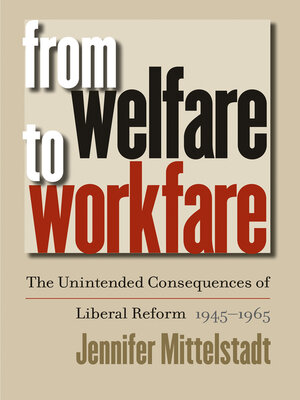From Welfare to Workfare
ebook ∣ The Unintended Consequences of Liberal Reform, 1945-1965 · Gender and American Culture
By Jennifer Mittelstadt

Sign up to save your library
With an OverDrive account, you can save your favorite libraries for at-a-glance information about availability. Find out more about OverDrive accounts.
Find this title in Libby, the library reading app by OverDrive.



Search for a digital library with this title
Title found at these libraries:
| Library Name | Distance |
|---|---|
| Loading... |
In 1996, Democratic president Bill Clinton and the Republican-controlled Congress “ended welfare as we know it” and trumpeted “workfare” as a dramatic break from the past. But, in fact, workfare was not new. Jennifer Mittelstadt locates the roots of the 1996 welfare reform many decades in the past, arguing that women, work, and welfare were intertwined concerns of the liberal welfare state beginning just after World War II.
Mittelstadt examines the dramatic reform of Aid to Dependent Children (ADC) from the 1940s through the 1960s, demonstrating that in this often misunderstood period, national policy makers did not overlook issues of poverty, race, and women’s role in society. Liberals' public debates and disagreements over welfare, however, caused unintended consequences, she argues, including a shift toward conservatism. Rather than leaving ADC as an income support program for needy mothers, reformers recast it as a social services program aimed at “rehabilitating” women from “dependence” on welfare to “independence,” largely by encouraging them to work. Mittelstadt reconstructs the ideology, implementation, and consequences of rehabilitation, probing beneath its surface to reveal gendered and racialized assumptions about the welfare poor and broader societal concerns about poverty, race, family structure, and women’s employment.
Mittelstadt examines the dramatic reform of Aid to Dependent Children (ADC) from the 1940s through the 1960s, demonstrating that in this often misunderstood period, national policy makers did not overlook issues of poverty, race, and women’s role in society. Liberals' public debates and disagreements over welfare, however, caused unintended consequences, she argues, including a shift toward conservatism. Rather than leaving ADC as an income support program for needy mothers, reformers recast it as a social services program aimed at “rehabilitating” women from “dependence” on welfare to “independence,” largely by encouraging them to work. Mittelstadt reconstructs the ideology, implementation, and consequences of rehabilitation, probing beneath its surface to reveal gendered and racialized assumptions about the welfare poor and broader societal concerns about poverty, race, family structure, and women’s employment.







